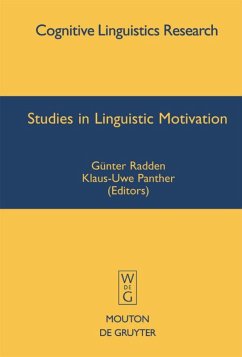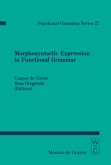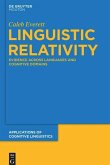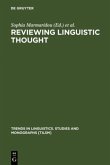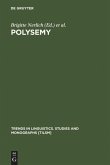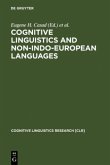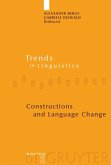How much of language is motivated? Recently, cognitive and functional linguists have proposed new solutions to this intriguing question. The thirteen articles collected in this volume cover various aspects of motivation in grammar and in the lexicon.
The phenomena discussed in the contributions can be grouped into four types of motivation, which, along with other types, are explicated in the introductory chapter: ecological motivation, i.e. motivation of a linguistic unit due to its place, or "ecological niche," within a system; genetic motivation, i.e. motivation of present-day linguistic behavior or structure due to historical factors; experiential motivation, i.e. motivation that is based on embodied experience; and cognitive motivation, i.e. motivation that is based on human knowledge and cognitive operations such as metonymy and metaphor. The languages studied in some detail include Afrikaans, Croatian, Dutch, English, French, German, Hausa, and Hungarian.
This volume makes a strong case for the pervasiveness of motivation in natural language. It will be of interest to teachers, researchers and students of linguistics, especially of functional and cognitive linguistics.
Hinweis: Dieser Artikel kann nur an eine deutsche Lieferadresse ausgeliefert werden.
The phenomena discussed in the contributions can be grouped into four types of motivation, which, along with other types, are explicated in the introductory chapter: ecological motivation, i.e. motivation of a linguistic unit due to its place, or "ecological niche," within a system; genetic motivation, i.e. motivation of present-day linguistic behavior or structure due to historical factors; experiential motivation, i.e. motivation that is based on embodied experience; and cognitive motivation, i.e. motivation that is based on human knowledge and cognitive operations such as metonymy and metaphor. The languages studied in some detail include Afrikaans, Croatian, Dutch, English, French, German, Hausa, and Hungarian.
This volume makes a strong case for the pervasiveness of motivation in natural language. It will be of interest to teachers, researchers and students of linguistics, especially of functional and cognitive linguistics.
Hinweis: Dieser Artikel kann nur an eine deutsche Lieferadresse ausgeliefert werden.
"To be sure, this book paves the way to future cognitive analyses which will take into serious consideration various strands of motivation, from ecological motivation to cognitive motivation."
Cristiano Broccias in: The Linguist List
"This volume makes a strong case fort he pervasiveness of motivation in natural language. It will be of interest to teachers, researchers and students of linguistics, especially of functional and cognitive linguistics."
In: Folia Linguistica, 1-2, 2005
Cristiano Broccias in: The Linguist List
"This volume makes a strong case fort he pervasiveness of motivation in natural language. It will be of interest to teachers, researchers and students of linguistics, especially of functional and cognitive linguistics."
In: Folia Linguistica, 1-2, 2005

